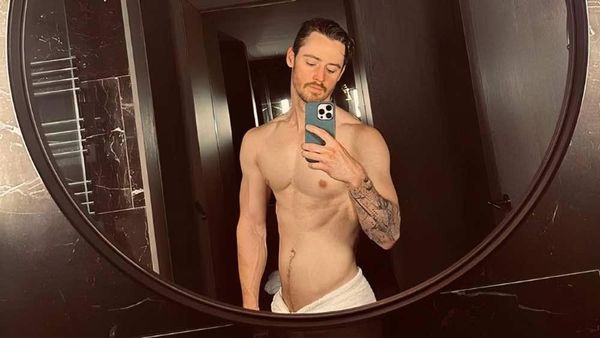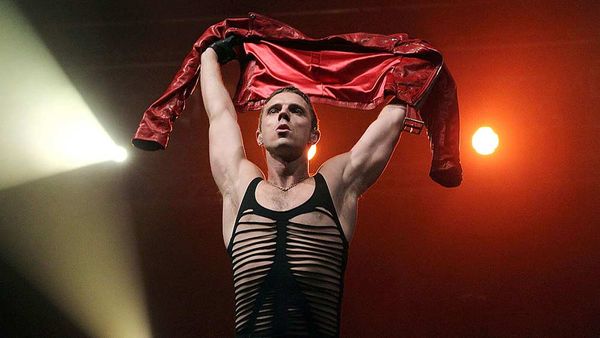September 25, 2014
Better Than Fiction :: William J. Mann on Murder and Mayhem in 'Tinseltown'
Kilian Melloy READ TIME: 14 MIN.
William J. Mann made a name for himself among gay readers for his trilogy of "Men" novels ("The Men From the Boys," 1997; "Where the Boys Are," 2003; and "Men Who Love Men," 2007), as well as two additional novels, "All American Boy" (2005) and "Object of Desire" (2009).
But Mann, a film scholar and historian, also carved out a niche for himself among movie buffs and cineastes - a big niche, with books such as "Wisecracker: The Life and Times of William Haines" (1998), a biography of the first Hollywood film star to refuse to hide his homosexuality; "Behind the Screen: How Gays and Lesbians Shaped Hollywood" (2001); "Edge of Midnight: The Life of John Schlesinger" (2005), about the English actor who ended up in Hollywood and became a well-regarded director, helming the seminal film "Midnight Cowboy"; "Kate: The Woman Who Was Hepburn" (2006); "How to Be A Movie Star: Elizabeth Taylor in Hollywood" (2009); and, most recently, "Hello Gorgeous: Becoming Barbra Streisand" (2012).
In amongst that veritable barrage of publication, and into the crack between genres, falls "The Biograph Girl," (2000), a fictionalized account of Florence Lawrence, reputed to have been "the world's first movie star." If that book is a novel resulting from the imaginative massaging of history, then Mann's newest work, "Tinseltown: Murder, Morphine, and Madness at the Dawn of Hollywood" is history written with the novelist's flair for both drama and characterization.
But more on that in a moment. Right now, it's worth pausing to take in the fact that Mann's current slate of endeavors makes his turn-of-the-millennium blizzard of books look like the calm before the storm. Even he alighted momentarily to talk with EDGE about "Tinseltown" recently, Mann was busily juggling a plethora of stage, film, and print projects. He's got a musical stage version of the Elizabeth Taylor bio, "How to Be A Movie Star," simmering away, along with an upcoming film based in the Katharine Hepburn bio - and both a musical and a movie based on "Wisecracker."
But that's not all.
"They're all in the works, and it's very exciting," Mann told EDGE. "The musical version of 'Wisecracker' is being spearheaded by my friend David Lee, the Emmy-winning producer of 'Cheers' and 'Frasier.' He's directing, and [also] writing the book with Barry Harman. I'm involved in creative consultations, and it's so fascinating watching David and Barry figure out how to tell Billy Haines's story on stage.
"On 'Liz and Debbie,' which is what we're calling the musical based on my Elizabeth Taylor biography, I am writing the book with Michael Zam and Jaffe Cohen, and music will be by someone I can't quite announce yet, but who's got a Grammy and some major Broadway credits," Mann continued. "We're meeting this weekend to talk about the next steps in all of that, and that's pretty exciting.
"Michael, Jaffe and I have formed a production company, and we're developing several projects, some based on my books and some new ideas," the author added. "They've written a great script for 'Wisecracker,' and Kimberly Peirce might direct."
Mann noted that the "Kate" biopic "was just announced in Variety. I'm executive producer, and the director is going to be Clare Beavan, who directed a beautiful biopic about Daphne Du Maurier," the reputedly bisexual (or, possibly, lesbian) playwright and novelist whose works gave rise to several acclaimed films, including Hitchcock's masterpieces "Rebecca" (1940) and "The Birds" (1963), and Nicolas Roeg's famed horror drama "Don't Look Now" (1973).
For her part, the director, Beavan, has directed several notable films, including the documentary "Codebreaker," about the English mathematician Alan Turing, who not only contributed significantly to the computer age, but who also played a pivotal role in cracking the infamous Enigma code used by the Axis in World War II. But Turing, who was gay, was not showered with the accolades he deserved; instead, he was subject to house arrest by the British government because of his homosexuality, eventually committing suicide.
Given the still-ongoing controversy over Hepburn - also purported to have been a lesbian, and in any case a trailblazer who pushed the gender role envelope at a time when society at large, and the people behind the movies in particular, were highly reactionary about gender and sexuality - Beavan's involvement seems a natural fit.
"Michael and Jaffe are writing the screenplay for 'Kate,' " Mann went on to say. It's a lot of fun. Writing and researching books is such solitary work, and I've been really longing for some more collaboration, working on projects that are more collaborative. These projects have really given me that opportunity."
But wait, dear reader. There's still more!
"In addition to all that, we're very, very close to announcing a deal for a miniseries based on 'Tinseltown,' and that book hasn't even been published yet!" Mann enthused. "Add that to the mix, and I'm just going to have to give up sleep or something, there's so much going on. But these are good problems to have."
Good problems, indeed. Given the public's constant, deeply rooted fascination with Hollywood, "Tinseltown" seems a sure thing - in which case, Mann's labors will no doubt only increase.
"Tinseltown" is a study in big dreams chased by little people - and big people with even bigger dreams. It's a history of swindlers, starlets, moralizers, politicians, tycoons, and a public so bedazzled by the silver shimmer of cinema that it's fallen deeply... and, to some ways of thinking, dangerously... in love with the movies. There are scandals and secrets galore in the pages of "Tinseltown," and colliding ambitions that leave carnage in their wake but also forge empires. In short, it's a story that could happen today - really, it's not so different from the stories that crowd contemporary tabloids and stoke the fires of the strict and the censorious.
But "Tinseltown" unfolds in the early 1920s, against a backdrop of overdoses, suicides, and the murder of an influential film director and Hollywood apologist named William Desmond Taylor. Like many of the industry's power players, Taylor kept a long list of potentially explosive secrets tucked away. And his murder was never solved... until now, that is, Mann assures us with his investigation in the book.
Today Taylor's murder is nothing but a footnote, but at the time it was the straw that could have broken the camel's back and left Hollywood stillborn.
That the book feels so contemporary is less a surprise. "In some ways, what was going in in the 1920s was exactly the same as what's going on now: Celebrities were becoming more famous their off-screen behavior than for any work that they did; the right wing was crying out for censorship and saying that Hollywood was destroying America's values; the government was trying to regulate the money that was being made," Mann noted.
"It's really the same old eternal story. But in those days, a scandal from a top movie star was seen as something terrible and troubling, and 'How do we regain the public's trust?' Whereas today, there's no such thing as bad publicity. Which, by the way, is the catch phrase for the musical based on the Elizabeth Taylor bio, 'Liz and Debbie.' "
Indeed: As Mann demonstrated in the Elizabeth Taylor biography, Taylor was instrumental in ushering in our current age of bad boy (and girl) celebrities, a cohort whose impact as entertainers is amplified by their role as "infotainers," with every arrest, romantic fall-apart, and substance-fueled rampage generating global headlines.
"1922, of course, was half a century before Elizabeth Taylor," Mann pointed out. "At that point, bad publicity was still something that you tried to avoid."
Hence, the stakes facing the architects of the motion picture revolution - men like Adolph Zukor, a Hungarian-born dynamo who rose from poverty to build Famous Players-Lasky (the parent company and forerunner of Paramount Pictures) into an enormous concern. With "church ladies" and Bible wielding zealots (many of them the same people who had succeeded in foisting Prohibition on America) breathing down their necks, Zukor and other major figures in the business needed to tread very carefully. Zukor made Taylor - a well-spoken, outwardly respectable man - the face of Hollywood, and a voice of anti-censorship reason.
Considering the climate at the time - with newspapers goosing every Hollywood-related tragedy into events of apocalyptic proportion, and with the infamous Fatty Arbuckle scandal inflaming public sentiment - Taylor's murder threatened to unleash a seismic backlash that might well have led to federal censorship. The mystery of Taylor's killer - who it was, what the motive could have been - became entwined with a desperate conspiracy to keep a lid on the story before it could surge into an uncontrollable firestorm.
Everything about this story is epic in scope: The passions involved, the sheer number of people embroiled in its dramatic unfolding, the dense, knotty skein of circumstance that led up to the climactic killing and then, even more disorienting, the fast-forward avalanche of rumor, fear, move and counter-move, and evidence stolen, concealed, and strategically deployed.
Mann lays out the multiple threads of plot(s) and characters with the skills he's honed as a novelist, but also with the judgment and the eye for priority that he's developed as an historian. The result is a true crime murder mystery that doubles as a work of fast-moving, highly detailed period fiction... except that it's not fiction at all.
"I had really wanted to try that with this book," Mann said. "I had fallen in love with books like 'Midnight in the Garden of Good and Evil,' and 'Devil in the White City,' which were true and based on fact, but told in a novelistic way. This story seemed the vehicle to try to do that. It reads like fiction but everything is sourced in the notes."
If nothing else, the story and nature of "Tinseltown" seems like the perfect synthesis of Mann's fields of expertise.
"I've known about the murder ever since I started becoming interested in Hollywood history, which was in my teens," the author reflected. "So many people have tried to solve this case before. I knew that to try and tell that story that, A., I had to try and solve the mystery of who killed William Desmond Taylor -- and I think I have; but also, B., I had to say why that mattered. It wasn't enough just to tell the story of the murder, because that would have just been doing the same thing that everybody else has tried to do. I felt that in telling the story, I had to put in the context of Hollywood and how the film industry was changing, how it was influencing American culture in such a profound way - like nothing ever before, in fact. Hollywood was suddenly the nation's fourth-biggest industry; it was changing the way people thought, the way women thought, the relationships between men and women; it was breaking down barriers and changing attitudes about class and race.
Hollywood in 1920 was really revolutionary! It really was, literally, changing the world. Then this murder happens in the midst of all that. I wanted to be able to tell both stories: The more intimate story of the murder, but also what was going on in the film industry and in the culture at large.
"I knew the characters had to be important," Mann added. I had to really make these characters compelling, and I didn't have to work very hard, because they really were - they really were fascinating people."
As is true of any epic, there is a mere handful of individuals at the heart of "Tinseltown," and they are, as Mann testifies, fascinating - talented, beautiful, misunderstood, and flawed. They include a foursome of formidable women: Mary Miles Minter, a very young starlet driven by her relentless stage mother, Charlotte Shelby, who fell in love with Taylor when working with him on a series of films starting with "Anne of Green Gables" (1919); Shelby herself, whose rages were legendary, and who threatened to murder Taylor if he didn't stay away from her daughter; and Mablel Normand, who came within a whisker of being another in a long list of Hollywood tragedies thanks to substance abuse problems, but who pulled herself out of addiction through sheer willpower - and then never received any credit for her remarkable feat.
"I fell in love with Mabel Normand in my book," Mann added. "I really think she's been such a maligned person in film history. If people remember her at all, they have the idea of, 'Oh yeah, wasn't she the drug-addicted star who ended up on skid row?' It's so not true, it's not what happened. Telling these stories and rescuing these people from the dustbin of history and setting some things straight was really important for me."
Then there was the fourth woman, Margaret "Gibby" Gibson, also known as Patricia Palmer, a woman who came tantalizingly close to stardom, only to fall short - and resort to every manner of scheme, legitimate or not, to keep her dream of stardom alive. Her need to succeed drove her to consort with an array of desperate, shady people (Mann refers to them in the book as "locusts," possibly in reference to the Hollywood-bashing novel "The Day of the Locust"), but also to achieve her own remarkable feat in becoming one of Hollywood's first female producers - not that it helped her much.
"Some of the characters in my book, because they can't make it in the big studios, are making not even B pictures, but Z pictures at these ramshackle studios," Mann related. "And there are still people [in Hollywood and elsewhere] who are doing the same thing today; they're just doing it with video cameras now, web cams, and they're making these movies because they are determined to get noticed and get attention. It drove people in 1920 and it still drives people in 2014.
Taylor himself is one of the most inscrutable characters in the book.
"Yeah, and he was a hard character to figure out, because he was such a man of mystery," Mann noted. For the writer, there was the additional strangeness of describing the persona, and the fate, of a man who shared his own name - not something entirely new for Mann, who mused, "It's funny: I've often written about 'Billies.' The book about William Haines put me on the map. People will talk to me about 'Billy,' and I'm thinking, 'Who are they talking about? Is it Taylor? Is it Haines? Is it me?' "
Of course, as noted earlier, what also put Mann on the map were his novels - in particular, "The Men from the Boys" and its sequels, which served as touchstones to a generation of young gay men. With so much happening around his shelf-load of non-fiction work, one might get the impression the novels are languishing and forgotten. Not so!
"My novels are currently being reissued as ebooks, which is nice," Mann told EDGE. "What I'm doing now is, in some ways, a hybrid of the two formats, fiction and nonfiction, because I am writing these 'creative nonfiction books' like 'Tinseltown.' And the new book I'm working on about Alice and Eleanor Roosevelt will also be in this vein, written in a novelistic style. I think I'm still [using the novelistic techniques I developed writing] those books, more than ten years ago, now."
Wait: A book about Alice and Eleanor Roosevelt?!
"It's called 'Alice and Eleanor: The Wars of the Roosevelts,' " Mann teased. "It'll come out from HarperCollins in the fall of 2016, just in time for the presidential elections."
Yes, but, well... that's sort of a stunner, really, given what a departure it marks. And yet, given Mann's penchant for writing about strong women, it ties in with his authorial trajectory.
Mann agreed. "It's the story of, again, two really remarkable women: Alice Roosevelt, who is the daughter of Teddy Roosevelt, and Eleanor Roosevelt, who was her first cousin and who, of course, married their fifth cousin, Franklin Roosevelt," he clarified. "There was this lifelong rivalry between the two of them. They were very different women: One was Republican and one was Democrat; one was conservative, and one was liberal; one was very beautiful and gregarious, and the other was kind of shy and plain. But the rivalry that they had between themselves, and the rivalry between their two families, really set the tone for the politics of the next fifty years. These two remarkable women have been chronicled before, but their particular story together has never been told."
Not to mention the fact that the theatrical arts and politics rely, substantially, on an underlying aptitude for showmanship.
"And living bigger than life - absolutely," Mann said. "I wanted to do a book that was not about Hollywood, but... in so many ways, it's still the same thing. They're still performing for the public stage, and they still have public images that are very different from their private [personae]. Their public personae aren't necessarily their true, authentic personae. And though politics and Hollywood are much the same thing, [when it comes to politics] the consequences are greater - we're talking about Eleanor Roosevelt, who ended up becoming one the most influential women of the 20th Century."
So, let's summarize. William J. Mann, film historian and popular gay novelist, has found a way to fuse those genres - even as he branches out into film and stage projects. What could Mann have up his sleeve next?
"I'll always write books - I'm contracted for another book after 'Alice and Eleanor,' so I am all set for the immediate future in terms of books," the writer disclosed. "But I do want to try to develop these other projects that we've talked about, and there are a couple of other projects we're trying to develop and get off the ground."
EDGE angled for more detail on that provocative tidbit, but Mann, with a well-earned sense for the dramatic power of secrets, declined to say more. Instead, he offered this parting thought:
"I'm hoping that five years from now there will be a very diverse group of projects that I am working on. I just never want to be typecast or get bored doing the same thing."
With "Tinseltown" as his latest success, Mann implicitly makes another point: His intelligent, curious explorations mean his readers won't be getting bored, either.
Kilian Melloy serves as EDGE Media Network's Associate Arts Editor and Staff Contributor. His professional memberships include the National Lesbian & Gay Journalists Association, the Boston Online Film Critics Association, The Gay and Lesbian Entertainment Critics Association, and the Boston Theater Critics Association's Elliot Norton Awards Committee.







